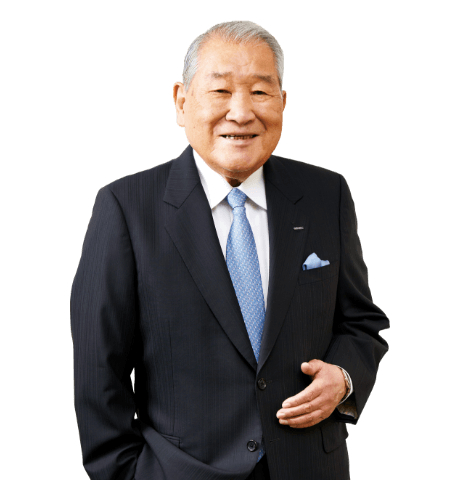- Value Creation
Story (PDF) - CEO
Commitment - COO Growth
strategy - CHO
Commitment - CFO
Commitment - Development
- Corporate
Governance

Rooted in our unwavering philosophy, we are generating sustainable corporate value with our world-class development capabilities and management foundation.
Kenzo Tsujimoto
Chairman and Chief Executive Officer (CEO)
To everyone battling this global challenge
Today, in 2022, the public and private sectors have been moving forward in assessing risks while working hard to resume and normalize socioeconomic activities, however COVID-19 continues to affect every aspect of our lives. The world also faces a myriad of issues that society must contend with, such as the invasion of Ukraine launched by Russia in February 2022. Unlike vaccines and other medicines, or infrastructures, such as networks, entertainment is not essential to our daily lives. However, in times like these, I believe that entertainment can bring people some joy and hope.
It is my hope that our business activities bring the people of the world the energy to fight through whatever difficulties they are facing.
Corporate philosophy and culture ––– Our unwavering philosophy since the company’s inception
Aiming to be #1: delivering the world’s best content “From Osaka, to the world”
Since Capcom’s inception, our unwavering corporate philosophy has been to create a culture of entertainment through the medium of games by developing highly creative content that excites and stimulates your senses and brings a smile to your face. This corporate philosophy represents the company’s social significance, inspiring our more than 3,500 people throughout the Capcom Group. “Games are luxury items, not essentials. That is why we need world-class brands that capture people’s attention.” I still believe this to be true even today, 50 years since I jumped into the world of entertainment.
Based on this corporate philosophy, Capcom has produced more than 700 games to date, and our games are played in over 220 countries and regions, outnumbering the membership of even the United Nations. In other words, our content is enjoyed throughout the world. Games are not essential items to our daily life; rather they are luxury items. Nevertheless, they are enjoyed the world over as items that enrich our lives and add excitement. Looking at market data, the global gaming population is estimated to be approximately 3 billion people.
Meanwhile, there are people in the world who cannot enjoy games due to disasters or conflict. It is my sincere hope that all of the people of the world will soon be able to enjoy games without worry, and at the same time, we would like to contribute in our own way to resolving the issues that people face.
Management Policy –––
Sustainable growth through creating and continuously leveraging our content
Game industry forecast
Technology will continue to progress unceasingly in the marketplace. Game development, promotions, infrastructure, and various other elements will also evolve along with it. In order to continue developing high-quality games, one of Capcom’s greatest strengths, it is essential that we build a system that allows us to consistently stand at the forefront of the ever-evolving industry and nimbly respond to new technologies and services. In April 2022, we reorganized our human resources-related departments and revised our system of compensation as part of our human resources investment policy. We are making steady investments for the future of Capcom for continued growth alongside the market.
Management direction—
Handling the global trend toward digital
In corporate management, it is important to always
think about things in terms of the future. For example,
nearly 10 years ago I gave an interview to a business
magazine where I said, “if we are able to sell world-class quality products at a low price
digitally, we will
see even greater improvement in our performance.”
At the time, disc sales were the mainstream and there
were very few customers who purchased digital
versions, so that idea may have been inconceivable
to most people. Also, because disc sales were the
mainstream, pirated versions of games prevailed in
most developing countries, but I also spoke about
how that “will promote further brand penetration if
we look at it in the long term.” As a result, now that
digital sales have spread throughout the world, of the
700 titles we have created, we are selling over 300 in
more than 220 countries and regions, a number that
exceeds that of the United Nations’ membership.
Creating top-class content not only produced this fiscal year’s performance, but it will be the tool that paves the way for our future. That is precisely why our management policy is to (1) create exciting, world-class content (IPs), and (2) maximize earnings by leveraging our rich library of IPs across multiple platforms and media, while (3) maintaining these policies to become a company of continuous, sustainable growth.
The COO’s discussion of growth strategies
Management strategy –––
Building a system to enable sustainable growth
Investing in human resources and development equipment to create world-class games
With 50 years of management experience in this industry, I have a keen awareness of the vital importance of technology that meets the highest standards in order to create the world’s most exciting games. We have strengthened hiring of newly graduated developers with an eye on the expanding game market and evolution of technology. In addition, we have access to world-leading development equipment both in-house and externally, and are vigorously investing in development equipment so that our creators can perform to their maximum potential. These efforts have been successful thus far and helped us achieve nine consecutive years of profit growth, but to overcome the hurdle of profit growth that rises every year and continue growing even more, we must further promote our investment in human resources.
Therefore, as part of our enhanced human resources investment strategy, in April 2022, we revised our compensation system, created the position of CHO, and reorganized our human resources-related departments. Our CHO will provide a detailed explanation, but we will continue hiring more than 150 employees annually while further enhancing the work environment to build an organization that allows our employees to demonstrate their creativity more than ever.
The CHO Discusses Our Human Resources Strategy
Business model and medium-term management goal –––
Advancing strategies that leverage our strengths
The strongest IP assets in our history and the capabilities to continue creating high-quality content
As of the fiscal year ended March 2022, Capcom has achieved nine consecutive years of increased operating income, and record-high profits in each of the last five fiscal years.
We will continue to create greater corporate value as we pursue our management goal of increasing operating income by 10% each fiscal year going forward.
Given the highly volatile structure of our industry, in which a major hit title one year can cause a comparative performance dip in the next, Capcom has made achieving stable profit growth each year an important issue for us in meeting the expectations of our shareholders, investors, and other stakeholders involved in our business.
In order to stably increase profits, and among growing concerns about the environmental impact of corporate activities in recent years, we have shifted from a business model that focused on disc sales to one based primarily on download sales with an eye toward strengthening the reach of our content globally.
As a result, Capcom’s sales territory has expanded to include almost all countries and regions with a few exceptions, and we sell over 300 different titles annually.
I believe two of our greatest strengths are (1) possessing numerous, popular IPs that have achieved global brand status, and (2) the developmental and technological capabilities to continue creating world-class, quality games.
Challenges to sustainable growth
According to reports from various external
organizations, it is expected that the game market
will continue to grow, and we can see that first-hand
at Capcom through our business activities within
that industry. As mentioned earlier, we sell our game
software in more than 220 countries and regions,
and from looking at our internal sales data, I believe
the number of users is sure to increase going
forward.
1. Human resources investment strategy
In recent years, our revenue foundation has been
shifting from the new titles we release in a given
fiscal year to our catalog of previously released titles.
Within our discussion of what is needed to sustainably expand this cycle, we determined that above all else, we need to review and reconstruct our human resources investment strategy. This strategy is based on a discussion of what is necessary to secure and train quality personnel going forward beyond the revision of the compensation system.
In fiscal 2021, we began by working on revisions of our compensation system. Capcom traditionally had a compensation system based on performance, such as incentive bonuses in the development division, but under this old system issues such as a lack of growth in annual income per individual employee became apparent. We have revised our compensation system, resulting in an average 30% increase in annual compensation. Going forward, in addition to the development division, we also have to make progress in revising work styles in our operational, sales, and administrative divisions.
When we look to the future, in order to produce superior content and distribute it to even more people around the globe, the entire company has to transform into a truly global enterprise, and our human resources system must take into account all our employees from all over the world. I believe we must establish an organizational structure with various systems, including benefits, to meet the needs of employees of various nationalities.
The CHO Discusses Our Human Resources Strategy
2. Responding to changes in user
preferences and technological innovation
As the market expands, game users will be offered a
wider variety of ways to play, and game purchasing
channels will diversify. What will become important
here is what users prefer amid the various options
offered. Therefore, in addition to macro data, such
as past sales data, it will be important to learn about
individual user trends.
In addition, the game industry is a treasure trove of cutting-edge technology, constantly providing the world with entertainment that uses the most advanced technology, including online battles, VR, AR, and 3D. This trend has only gained momentum with GAFA’s entry into the market, and the game industry is undergoing an unprecedented transformation. Under such circumstances, we need to attract talent who possess the most advanced skills and accurately predict and respond to cutting-edge technological development trends in order to create games that will become global hits.
3. Challenging ourselves to reach 100 million units in annual sales, expanding and strengthening our global brand
It is said that the population of the world will reach 8 billion in November 2022 and that there are already 3 billion game users.
In fiscal 2021, our annual sales totaled 32.6 million units. That is a mere 1.1% of the worldwide market share. Although Capcom’s game content is sold in almost every country and region around the world, depending on the country and region, we cannot say that Capcom has penetrated the market as a game brand. In order to reach 100 million units in annual sales, it is important that both our game brands and our corporate brand are strengthened and achieve penetration in the market in these countries. Three years ago, we restructured the departments related to marketing strategy and separated them from the sales division, instead positioning them as planning and strategy departments. We established a data analysis section in this department and had them start organizing past sales data and using it to simulate future sales volume, which has generally produced the desired results. This is one example of the initiatives Capcom is implementing in our digital transformation (DX). As we make progress with this initiative, we will be able to grasp sales trends in each country and region and use them in our measures to expand.
In addition, to strengthen our brand across the world, we will reinforce coordination between our game content and our peripheral businesses, such as eSports, movies, and licensing.
Sustainability ––– Initiatives geared toward sustainable growth
Increasing corporate value by building healthy relationships and a sturdy framework
1. Sustainable growth achieved
by a game company
I believe that building a healthy relationship with
stakeholders through business activities leads to
improved corporate value. Therefore, focusing
particularly on “S” (social) and “G” (corporate
governance) of ESG, I recognize our critical issues as
(1) developer numbers, (2) diversity, (3) support for
education, and (4) the ratio of external directors.
In addition, we have started to shift our awareness to the next stage of our company in light of our business performance growth in recent years. We will continue to promote ESG initiatives based on the SDG goals of creating a sustainable society and strive for sustainable growth while building a relationship of trust with our stakeholders.
2. Game company environmental measures
Capcom’s efforts to digitalize game sales not only
improve profitability, but also reduce our
environmental footprint by removing package
manufacturing from the equation. Meanwhile, in
order to promote better work-life balance among
our employees, we also encourage employees to
live closer to their workplaces by arranging company
housing and bicycle parking areas. We can expect
this to reduce the emission of greenhouse gases
incurred by long commutes. In June 2022, we
introduced CO2-free electricity generated by
renewable energy sources in the buildings that we
own in the Kansai region. Our work in selling digital
content itself has a relatively low environmental
impact compared to other businesses, but we should
do whatever we can to reduce our environmental
footprint as much as possible. Mitigating climate
change is an issue that requires the cooperation of
everyone who inhabits the planet, and we will
continue to promote environmental preservation
initiatives.
3. Building a healthy relationship between
games and society
Although there is a need for games in society, there
are also some challenges, such as expensive
in-game purchases made by minors and game
addiction. Our purpose is to make people happy
through games. Making people unhappy because
of games is certainly not our intention. We are
aware that these are major issues for our industry as
a whole, and each company is cooperating as part
of an industry organization to make efforts to (1)
establish guidelines and educate people about
them, (2) share problems and actual examples
among member companies, and (3) exchange
information on a regular basis with parents,
educators, consumer groups, and government
administrators.
Relationship
with Customers (PDF:
123KB)
In addition, since 2004, we have independently continued to be involved in game-related educational support activities as an initiative to alleviate social concerns surrounding games.
Promoting Healthy Relationships with Games (PDF: 54KB)
4. Commitment to regional communities
The promotion of our Single Content Multiple
Usage strategy provides society with a wide range
of benefits. Specifically, these include the use of
popular Capcom IP in local revitalization activities to
support (1) economic development, (2) cultural
development, (3) awareness for crime prevention
and (4) awareness of elections. We are achieving
quantitative social outcomes through solving the
common problem of attracting and appealing to
the youth demographic.
In addition, as a further contribution to society, we will actively provide support for the promotion of social welfare, sports, technology, and culture.
Relationship with Regional Communities (PDF: 264KB)
5. Commitment to employees
I recognize the importance of diversity for creating
content that will resonate globally, thus Capcom
promotes the retention and training of talented
human resources without regard for gender or race.
We continue to make efforts to improve the workplace
environment, and in 2017, we implemented an on-site
daycare called “Capcom Juku” to provide employees
with children an environment in which they can work
with greater peace of mind.
Relationship with Employees (PDF: 268KB)
In addition, in terms of compensation, we made various revisions in April 2022, raising the average base salaries 30% and introducing an ESOP trust that grants company stock to employees in an effort to increase motivation.
6. Continued anti-fraud measures
for stable growth
As a company that handles data, it is important
that we protect its value and associated rights. We
continue to constantly detect and delete pirated
versions of games and illegal video content from the
internet. In recent years, the risk of cyber-attacks is
also growing as digital network technology becomes
more widespread. In light of the unauthorized access
to our network in 2020, we have established the
Information Technology Security Oversight
Committee, and continue to promote ever-stronger
countermeasures.
Governance ––– Creating a sustainable system prioritizing objectivity
Strengthening our corporate governance structure
Sound governance is essential for achieving the sustainability I discussed in the previous section. Specifically, with myself, Capcom’s founder, as CEO and my oldest son as COO, we can avoid management decision risks by sufficiently leveraging the supervisory function of the external directors, and with unique mechanisms for highly transparent and rational decision making built by the Board of Directors.
Mechanism 1 Management visualization based on numbers
In order to conduct integrated management, I require that materials (documents) used for decision-making are, in principle, quantitatively focused, in other words, we are employing management visualization. These materials provide comparisons by net sales, year-on-year performance and against earnings forecasts, which make it easier to identify problems by enabling us to confirm the details in multiple ways.
Mechanism 2 Continued governance reforms
For the past 23 years, Capcom has executed a variety of governance reforms.
Since introducing the external director system in the fiscal year ended March 31, 2002, external directors have increased to account for 46.7% of the Board of Directors. External director appointment criteria have not changed since the system was introduced, but in short, we appoint directors with insight who are highly proficient specialists in their respective areas outside the gaming industry, capable of objectively making decisions regarding Capcom’s management and business activities. With the avoidance of business investment risk as a priority issue, Capcom appoints individuals who are able to provide sound opinions, especially when earnings are subpar, who are not intimidated by the company founder and are able to determine validity from the general public’s point of view.
In June 2022, we increased the number of external directors by two in order to further enhance the human resource capabilities of management and the supervisory function of the Board of Directors.
Key commentary on our human resources strategy from our external directors
Mechanism 3 Creating a business management system and grooming successors
For the last 39 years, I have built the Capcom framework based on my own management philosophy, and it is also my responsibility as the founding executive to ensure my successors have a proper understanding of its mechanisms and are able to execute them. Plans for my successor are being made through discussions with the Nomination and Remuneration Committee; if we can prepare my successor and enmesh that with our corporate philosophy and well-structured governance, we can achieve stable growth.
Rewarding long-term shareholders with 32 consecutive years of returns since Capcom’s listing and record-high dividends
In closing I would like to share my ideas regarding our capital policy, which is an important element of the relationship I have with our shareholders.
1. Basic policy regarding dividends
During my 39 years of management since founding
Capcom, my philosophy has been to pursue stable
corporate growth and reward long-term shareholders
with steady increases in dividend payments despite
the constantly changing nature of the game industry.
I have already mentioned the factors critical for sustainably enhancing corporate value; as shareholder returns are also an important management issue, dividends are determined with consideration for future business development and changes in the management environment. However, as the business environment is undergoing significant changes, it is also necessary to consider investment geared toward sustainable growth.
In consideration of these factors, Capcom’s basic shareholder return policy aims to (1) enhance corporate value (market capitalization) through investment in growth, (2) continue paying dividends (30% payout ratio) while striving for stable dividends and (3) flexibly acquire treasury stock to increase the value of earnings per share.
The reason I think both the payout ratio and stable dividends are important is, for example, because a sudden decrease or cessation of dividends can be risky for pensioners who depend on dividends to cover part of their lifestyle expenses. Regular revenue leads to the establishment of a stable lifestyle plan for the future. We also receive requests for stability from the long-term investors who manage those pensions.
Capcom shareholders represent all types of people, and I assume some of them may be facing these kinds of issues, which is why we have never once failed to provide dividends during the 32 years since we went public in 1990. If we consider the split at the fiscal year ended March 2022, we have seen five consecutive years of increased dividends.
As a result, the total shareholder return (TSR), including the rise in stock price over the last five years, was +572.0%, exceeding TOPIX (+144.3%) and positioning Capcom ahead of any of our industry competitors.
2. Dividends for this fiscal year and the next
For the next fiscal year (ending March 2023), we plan
to pay an annual dividend of 46 yen per share, which
represents a payout ratio of 28.5%. As the payout ratio
is less than 30%, we will review the dividend amount
when the consolidated earnings forecast for the next
fiscal year becomes clearer.
As a senior executive with many long years of experience in the game industry, my goal is to increase market capitalization and achieve corporate growth exceeding that of the past 39 years in order to continue meeting the expectations of Capcom shareholders, investors, and all other stakeholders.
Kenzo Tsujimoto
Chairman and
Chief Executive Officer (CEO)

CAPCOM INTEGRATED REPORT 2022
PDF (Complete version) (PDF: 12.2MB / 104 pages)
PDF (by section)
Value Creation Story
(PDF: 3.5MB / 24 pages)
- Create Financial and Non-Financial Value
- Corporate Philosophy
- Value Creation Model
- History of Value Creation
- Major Intellectual Properties (IP)
- Effectively Leveraging IP
- Digital Strategy / Human Resources Strategy Performance
- ESG Highlights
- Business Segments Highlights
- Financial Highlights
- Medium- to Long-Term Vision








